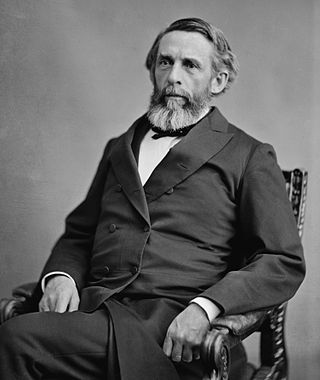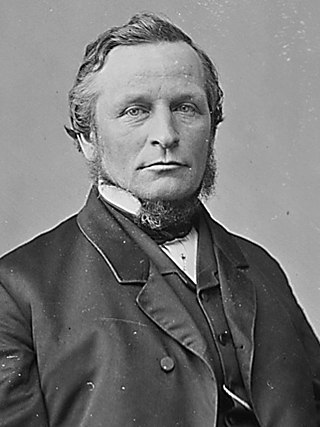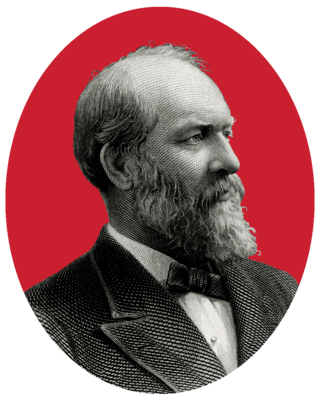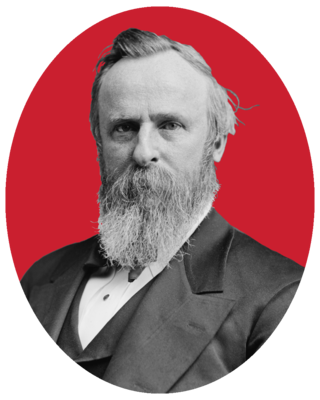
George Sewall Boutwell was an American politician, lawyer, and statesman from Massachusetts. He served as Secretary of the Treasury under U.S. President Ulysses S. Grant, the 20th Governor of Massachusetts, a Senator and Representative from Massachusetts and the first Commissioner of Internal Revenue under President Abraham Lincoln. He was a leader in the impeachment of U.S. President Andrew Johnson, and served as a House manager (prosecutor) in the impeachment trial.

John Davis Long was an American lawyer, politician, and writer from Massachusetts. He was the 32nd governor of Massachusetts, serving from 1880 to 1883. He later served as the Secretary of the Navy from 1897 to 1902, a period that included the primarily naval Spanish–American War.

The 1860 Republican National Convention was a presidential nominating convention that met May 16–18 in Chicago, Illinois. It was held to nominate the Republican Party's candidates for president and vice president in the 1860 election. The convention selected former representative Abraham Lincoln of Illinois for president and Senator Hannibal Hamlin of Maine for vice president.

Henry Laurens Dawes was an attorney and politician, a Republican United States Senator and United States Representative from Massachusetts. He is notable for the Dawes Act (1887), which was intended to stimulate the assimilation of Native Americans by ending the tribal government and control of communal lands. Especially directed at the tribes in Indian Territory, it provided for the allotment of tribal lands to individual households of tribal members, and for their being granted United States citizenship. This also made them subject to state and federal taxes. In addition, extinguishing tribal land claims in this territory later enabled the admission of Oklahoma as a state in 1907.

William Barrett Washburn was an American businessman and politician from Massachusetts. Washburn served several terms in the United States House of Representatives (1863–71) and as the 28th governor of Massachusetts from 1872 to 1874, when he won election to the United States Senate in a special election to succeed the recently deceased Charles Sumner. A moderate Republican, Washburn only partially supported the Radical Republican agenda during the American Civil War and the Reconstruction Era that followed.

William Claflin was an American politician, industrialist, and philanthropist from Massachusetts. He served as the 27th governor of Massachusetts from 1869 to 1872 and as a member of the United States Congress from 1877 to 1881. He also served as chairman of the Republican National Committee from 1868 to 1872, serving as a moderating force between the Radical and moderate wings of the Republican Party. His name is given to Claflin University in South Carolina, a historically black college founded with funding from him and his father.
The Massachusetts Republican Party (MassGOP) is the Massachusetts branch of the U.S. Republican Party.

The 1880 Republican National Convention convened from June 2 to June 8, 1880, at the Interstate Exposition Building in Chicago, Illinois, United States. Delegates nominated James A. Garfield of Ohio and Chester A. Arthur of New York as the official Republican Party candidates for president and vice president in the 1880 presidential election.

The 1876 Republican National Convention was a presidential nominating convention held at the Exposition Hall in Cincinnati, Ohio on June 14–16, 1876. President Ulysses S. Grant had considered seeking a third term, but with various scandals, a poor economy and heavy Democratic gains in the House of Representatives that led many Republicans to repudiate him, he declined to run. The convention resulted in the nomination of Governor Rutherford B. Hayes of Ohio for president and Representative William A. Wheeler of New York for vice president.
The 1877 United States Senate election in Massachusetts was held in January 1877. Incumbent Republican Senator George S. Boutwell, who had won a special election for the remainder of Henry Wilson's term, was defeated by reformist U.S. Representative George Frisbie Hoar.
The 1883 United States Senate election in Massachusetts was held in January 1883. Incumbent Republican Senator George Frisbie Hoar was re-elected to a second term in office despite a serious challenge from Democrats and members of his own party.

The 1880 Greenback Party National Convention convened in Chicago from June 9 to June 11 to select presidential and vice presidential nominees and write a party platform for the Greenback Party in the United States presidential election 1880. Delegates chose James B. Weaver of Iowa for President and Barzillai J. Chambers of Texas for Vice President.

The 1876 Massachusetts gubernatorial election was held on November 7. Incumbent Republican governor Alexander H. Rice was re-elected to a second term in office over former Minister to Great Britain Charles F. Adams.

The 1878 Massachusetts gubernatorial election was held on November 5. Former acting Governor Thomas Talbot, a Republican, defeated Benjamin Butler, who ran as an independent Greenback candidate with Democratic support. Butler's supporters secured a majority of delegates to the Democratic state convention, but his nomination was rejected by the state party committee after his supporters used violent tactics to exclude anti-Butler delegates from the convention hall.

The 1854 Massachusetts gubernatorial election was held on November 15. American Party candidate Henry J. Gardner was elected to his first term as governor, defeating incumbent Whig governor Emory Washburn.

The 1860 Massachusetts gubernatorial election was held on November 6. Incumbent Republican governor Nathaniel Banks did not run for re-election to a fourth term. He was succeeded by Republican John Albion Andrew, a radical abolitionist.

The 1874 Massachusetts gubernatorial election was held on November 3, 1874. Republican acting Governor Thomas Talbot, who took office after the resignation of William B. Washburn, was defeated by Democrat William Gaston, a former Mayor of Boston.

The 1872 Massachusetts gubernatorial election was held on November 5, 1872. Republican governor William B. Washburn was re-elected to a second term in office over businessman Francis W. Bird, a Liberal Republican nominated with support of the Democratic Party.

The 1868 Massachusetts gubernatorial election was held on November 3.

The 1867 Massachusetts gubernatorial election was held on November 5.





















